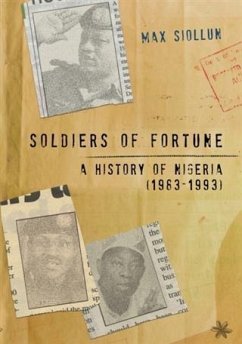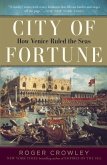The years between 1983 and 1993 were momentous for Nigeria. Military rule was a time of increased violence, rampant corruption, coups, coup plotting and coup baiting. It moulded the conditions and character of Nigeria today, forcing seismic changes on the political, economic and religious landscape that nearly tore the country apart on several occasions.
Soldiers of Fortune is a fast-paced and thrilling narrative of the major events of the Buhari and Babangida era. The book draws on previously uncovered observations from interviews conducted with insiders (including a former member of the Brigade of Guards and Nigerian Airways personnel who witnessed the attempted kidnap of Umaru Dikko), to compile step-by-step dramatic reconstructions of disputed events and intrigues. Siollun's fresh perspective challenges preconceived views to reveal the true story behind controversies of the period: the annulment of the June 12 election, the dubious execution of Mamman Vatsa, the foiled kidnapping of Umaru Dikko, the Orkar coup and the inconclusive case of the assassination of Dele Giwa.
Historian Max Siollun gives an intimate, fly-on-the-wall portrait of the major events and dramatis personae of the period. He paints a vivid picture of leaders such as Ibrahim Babangida, whose 'amiable personality, effusive charm and warm bonhomie' distracted from his determined grip on power, political cunning and retention of detested laws. Siollun also relates anecdotes from how 'pillow talk' had a role in the 1983 coup, to the troubled final hours of the condemned Mamman Vatsa, childhood friend of Babangida. We are reminded of the important role played by civilians in supporting and sponsoring successive coups, and as such, we are forced to reassess apparent heroes such as the business tycoon, M.K.O Abiola.
Alongside its close-up, dramatised narrative, Soldiers of Fortune also provides clear and detailed analysis of the period, revealing Nigerians' complicity in the corruption of everyday life. It makes use of charts, lists and neatly delineated sections to pick apart the complex and often murky details of military rule, effectively demonstrating how the key events and protagonists of the period had a long-lasting impact which still resonates throughout Nigeria today.
Both gripping and informative, Soldiers of Fortune is a must-read for all Nigerians and Nigeria-watchers. Its dramatic narrative style and clear attention to detail will engage casual, journalistic and academic readers alike.
Dieser Download kann aus rechtlichen Gründen nur mit Rechnungsadresse in A, B, BG, CY, CZ, D, DK, EW, E, FIN, F, GR, HR, H, IRL, I, LT, L, LR, M, NL, PL, P, R, S, SLO, SK ausgeliefert werden.









